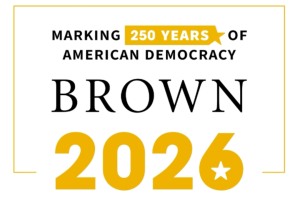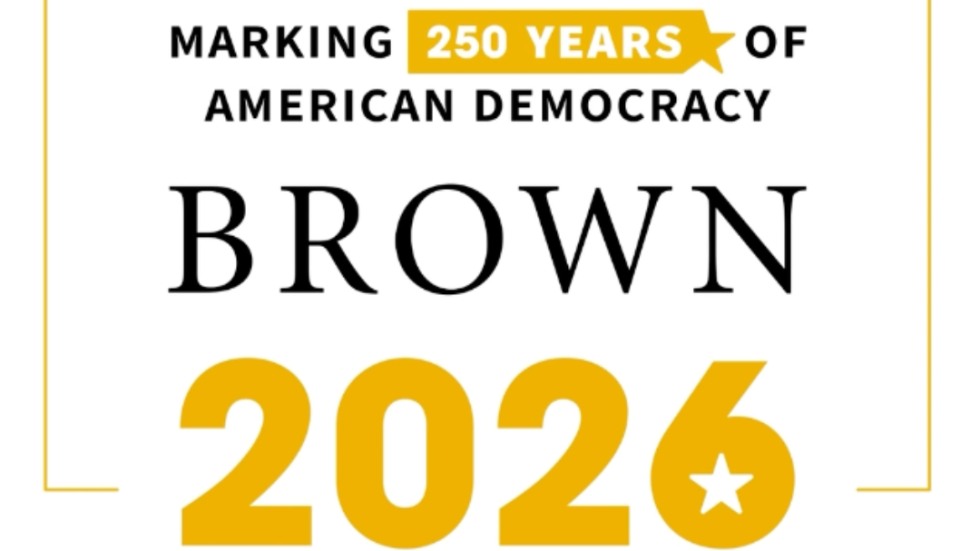Introducing Brown 2026 From Kevin McLaughlin and Karin Wulf, Brown 2026 Co-Chairs
We are pleased to share the website launch for the Brown initiative to mark the 250th anniversary of the founding of the United States through a multi-year exploration of the important role that university research and teaching plays in advancing open and democratic societies.
As the nation prepares to mark its semiquincentennial on July 4, 2026, the campus-wide, faculty-led initiative that President Paxson wrote about last January titled “Brown 2026” will include new academic courses, open-to-the-public lectures, reading programs, research grants, fellowships for visiting scholars and more. Brown 2026 will enable critical inquiry and reflection from a diversity of perspectives on the values and events that inspired the founding of the U.S. and an examination of the future of U.S. democracy.
With support from the Office of the President, Brown 2026 is designed to engage the full Brown community, as well as members of the public. Programming will span a vast array of scholarly disciplines, from the arts and humanities to the social, physical and life sciences. The initiative will support new research and projects, while also amplifying ongoing research and teaching at Brown related to American democracy.
Many of the pillars upon which Brown University was founded in 1764 — including freedom of expression and academic inquiry, diversity of thought, and respect for differences among people — also underpin free and democratic societies.
Brown 2026 will draw on Brown’s strengths as a rigorous, multidisciplinary research institution and as a community of learning that seeks to confront important questions that have faced democracies in the past and that democracies will continue to confront in the future.
Brown 2026 will also seek to expand knowledge about the complex values and events that led to the establishment of the United States amid conflict and the many legacies of the American Revolution. Brown’s commitment to reckoning with history, including its pioneering work to uncover its own historical ties to racial slavery, which yielded the landmark 2006 Report of the Brown University Steering Committee on Slavery and Justice, offer a strong foundation from which to start a campus-wide exploration of these issues.
This initiative builds on Brown’s long-standing commitment to open inquiry, demonstrated willingness to engage in discussions of complex and contested issues, and record of frank reckoning with history. This uniquely positions the institution among universities nationally to lead and conduct informed, nuanced discussions of the history and significance of the American Revolution and its legacies.
As part of the initiative, the University’s John Nicholas Brown Center for Advanced Study will, over the course of three years, host six visiting fellows who will give public lectures and work with faculty and students on scholarship related to the initiative. The center is currently hosting two fellows for the 2024-25 academic year: Marina Moskowitz, a University of Wisconsin professor and leading scholar in material culture in America beginning in the 18th century; and Simon Newman, an emeritus professor at the University of Glasgow and a renowned historian of the social and political history of early America, including the American Revolution, the transatlantic slave trade and the development of plantation slavery.
A steering committee for Brown 2026 is supporting the development of a variety of new courses as soon as Fall 2025 across a number of Brown’s academic departments, from the humanities to STEM disciplines, related to the initiative’s themes. Separately, Brown students will be invited to apply for research awards and educational experiences on topics related to Brown 2026, including projects that involve archival materials in the John Carter Brown Library and in Brown’s special collections.
We are also collaborating with campus community members to develop an array of public lectures, programs and activities related to universities and democracies. A set of activities called Brown 2026 Reads, for example, will focus on reading and discussion, including book talks on wide-ranging topics, student-focused opportunities to engage with specific books and their authors, and campus community reading groups. External partners for other Brown 2026 projects will include local organizations such as the Rhode Island Historical Society.
Open-to-the-public speaker visits are expected to kick off in early 2025 and as details are confirmed, they will be shared on the Brown 2026 website and Events@Brown calendar.
We are honored to be leading planning for Brown 2026 with the support of a steering committee of faculty members and academic leaders from a wide range of disciplines, including Africana studies, sociology, history, English, archaeology, political science, economics, arts and engineering. Rebecca Brenner Graham, a public historian and postdoctoral research associate in public humanities at the John Nicholas Brown Center, is serving as the Brown 2026 coordinator.
Sincerely,
Kevin McLaughlin
Brown 2026 Co-Chair, Director of the John Nicholas Brown Center for Advanced Study, Professor of English and Comparative Literature
Karin Wulf
Brown 2026 Co-Chair, Director of the John Carter Brown Library, Professor of History

